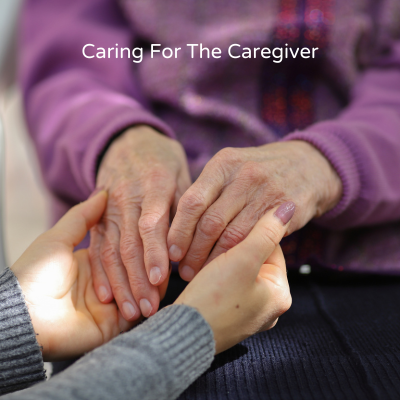Caring For The Caregiver

When illness strikes, it doesn’t just impact the patient but derails the entire family and even friends. The role of a caregiver is taken on as suddenly as an illness is discovered. There is hardly ever a time to prepare. The caregiver has a ringside view of the patient’s suffering and often suffers vicariously.
What Does Being a Caregiver Mean?
The role of a caregiver will largely depend on the illness and/or the specific needs of a patient. It includes both direct and indirect care. Direct care refers to what is done with the patient, like bathing, managing medications, assisting them when moving around, and taking them to doctor’s appointments. It also involves managing difficult behavior, calming them down when overwhelmed, and offering hope when they struggle. Indirect care involves tasks done for the patient – like managing their finances, delivering meals, operating their bank account, and so on.
Caregiving is extolled in our culture and is seen as an act of service and love. However, it is not without its toll. People assume the role in addition to all their other roles and responsibilities. Depending on its intensity, caregiving forces caregivers to take time off other responsibilities, including their jobs, or quit. This fosters the build-up of stress and a lack of self-care, leading to a decline in physical, mental, and social well-being. And even the most compassionate and sympathetic caregivers run this risk.
Who cares for the caregiver?
While the prime objective of palliative care is to help patients live the best quality of life, it also extends support to their families and carers.
To this end, palliative care:
Educates family & friends – Being prepared isn’t just a good motto for scouts; it applies to the every day, too, especially for caregivers. Knowing what to expect and how to manage various situations allows caregivers to respond appropriately. It reduces helplessness and anxiety. To help with this, palliative care teams ensure that family members are included in every meeting and can participate in shared decision-making and setting realistic care goals.
Offers caregivers practical tools – Patients and their caregivers must adapt to doing even the most essential things differently, especially as an illness progresses. Palliative care specialists provide caregivers with tools and methods to help them better assist those in their care. These include which foods are best for them, how to bathe them, or how to lift them off the bed, if needed, without causing pain. Other things like the right way to massage painful areas, how to keep track of medication, and so on also help manage care and time. When to contact health care providers or take the patient to the hospital are also essential tips. Often, caregivers rush patients to the hospital because they are ill-informed and ill-equipped to respond to a situation, even if it is not an emergency and can be managed at home. This increases the family’s distress and has financial implications that are an added burden.
Helps caregivers cope with stress – Palliative care specialists enforce the value of caregivers not neglecting themselves while caring for a patient. They help them work through frustrations, answer questions, and work out solutions to problems that may arise. They also offer recommendations for healthy ways to deal with stress.
Facilitates open communication – Palliative care specialists encourage patients to discuss their goals and opinions on treatment options. This helps caregivers make informed decisions on behalf of the patient.
Ask for help
As caregivers, we want to be there for our loved ones and ensure they know they are not alone on this journey. However, we must realize we are not alone either. While some old-world thinking might enforce the need for the family to look out for its own, we must recognize our limits and take advantage of the assistance offered through palliative care so that everyone can live their best life.






